The Spain nuclear phase-out, long planned to eliminate all reactors by 2035, has come under renewed scrutiny—and for good reason. Initially hailed as a step toward a greener future, the strategy has instead proven to be costly, disruptive, and potentially short-sighted.
For years, Spain planned to decommission its seven operating nuclear reactors, which currently supply about 20% of the nation’s electricity. The government bet heavily on renewables and battery storage to fill the gap. But this decision, made with limited technical and economic analysis, has led to serious concerns about energy security, grid stability, and industrial competitiveness.

The High Cost of Dismantling Reliable Energy
According to recent estimates, the total cost of dismantling Spain’s nuclear fleet and managing radioactive waste could exceed €20.2 billion. This figure doesn’t include the indirect economic impact of replacing reliable, low-carbon baseload power with less predictable alternatives.
Those billions could have been redirected to:
-
Modernizing existing plants for extended operation
-
Investing in renewable R&D and storage technologies
-
Strengthening the national grid to handle variable energy inputs
Instead, Spain now finds itself scrambling to compensate for a potential shortfall in stable electricity supply, just as the demand for clean, dispatchable power continues to rise.
Spain’s Nuclear Fleet: Still Safe, Clean, and Efficient
Spain’s reactors are among the most efficient power producers in the country, consistently operating at high capacity factors and delivering carbon-free energy without interruption. The plants have already undergone multiple safety and operational upgrades, aligning with international standards and best practices. For more context on Spain’s nuclear infrastructure and policy history, see the World Nuclear Association’s country profile.
Meanwhile, 31 countries worldwide—including the U.S., France, the UK, and China—have committed to tripling nuclear capacity by 2050. These nations view nuclear energy as a key pillar of a resilient, low-carbon energy future.
As other countries extend plant lifetimes and build new reactors, Spain’s exit strategy risks placing it at a competitive disadvantage—both economically and environmentally.
Policy Reversal: A More Pragmatic Approach Emerging
In a significant policy shift, Spain’s Parliament recently approved a proposal to reconsider the nuclear phase-out, recognizing the strategic value of nuclear power in providing stable, affordable, and clean electricity.
This move reflects a broader change in tone across Spanish politics and industry:
-
Energy companies and industrial leaders are calling for a technology-neutral approach to energy planning.
-
Opposition parties are pushing for policies grounded in data, security, and long-term economic viability.
-
Experts warn that a rushed shutdown could harm Spain’s decarbonization targets by increasing reliance on gas and imported electricity.
The Case for a Balanced Energy Mix
Rather than choosing between nuclear and renewables, experts argue Spain should pursue a balanced, diversified energy strategy that includes:
-
Lifetime extensions for safe, well-performing reactors
-
Increased investment in renewables and grid infrastructure
-
Support for advanced storage solutions and innovation
This combination would help Spain meet its climate commitments while ensuring energy security, industrial competitiveness, and price stability for consumers.
Conclusion: Time to Reclaim Spain’s Energy Leadership
The global energy transition is accelerating—and nuclear energy is playing a central role. Spain, once a leader in innovation and sustainability, now faces a crucial decision: stay on a costly, politically driven path, or pivot to a pragmatic strategy rooted in evidence and long-term planning.
As momentum shifts globally in favor of nuclear, the Spain nuclear phase-out stands out as a cautionary example of policy driven by politics rather than data.
👉 Want to explore how energy policy trends in Europe could impact your business or investments? Contact us to speak with our research team.
